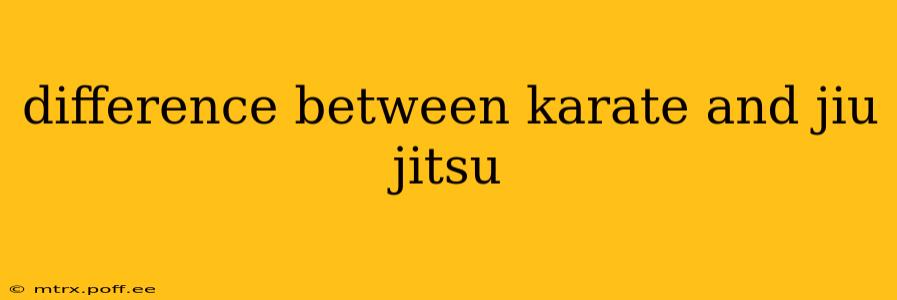Karate and Jiu-Jitsu, while both celebrated martial arts, differ significantly in their philosophies, techniques, and overall approaches to combat. Understanding these differences is crucial for anyone considering learning either art. This comprehensive guide will delve into the core distinctions, answering common questions and providing a clear picture of each discipline.
What is Karate?
Karate, originating in Okinawa, Japan, is a striking-based martial art emphasizing powerful punches, kicks, blocks, and open-hand techniques. Its focus lies in delivering impactful blows from a distance, utilizing speed and precision to incapacitate an opponent. Different styles of Karate exist, each with subtle variations in technique and emphasis, but the core principle of striking remains consistent.
What is Jiu-Jitsu?
Jiu-Jitsu, encompassing various forms, generally centers on grappling and ground fighting. While some styles incorporate striking, the primary focus is on controlling an opponent's body through holds, locks, and submissions. The goal is often to gain a dominant position and force a tap-out through joint manipulation or chokes. Brazilian Jiu-Jitsu (BJJ), a prominent modern form, emphasizes ground fighting and is particularly well-known for its effectiveness in mixed martial arts (MMA).
What are the Key Differences Between Karate and Jiu-Jitsu?
The fundamental difference lies in their preferred fighting ranges and techniques:
-
Fighting Range: Karate primarily operates at a distance, utilizing striking techniques. Jiu-Jitsu, conversely, often involves close-range combat and grappling on the ground.
-
Primary Techniques: Karate emphasizes punches, kicks, blocks, and open-hand strikes. Jiu-Jitsu focuses on grappling, takedowns, joint locks, chokes, and submissions.
-
Self-Defense Philosophy: Karate's self-defense philosophy often prioritizes preventing an attack through assertive stances and powerful strikes. Jiu-Jitsu's self-defense approach leans towards controlling and neutralizing an attacker, even if they are larger or stronger, by utilizing leverage and technique.
-
Physical Conditioning: Both disciplines require physical fitness, but the emphasis differs. Karate demands explosive power, speed, and agility. Jiu-Jitsu necessitates strength, endurance, flexibility, and a high level of ground fighting proficiency.
Which Martial Art is Better for Self-Defense?
There's no single "better" martial art for self-defense; the most effective style depends on individual preferences, body type, and potential scenarios. Karate's powerful strikes can be highly effective at a distance, deterring attackers before close-range combat becomes necessary. Jiu-Jitsu's grappling skills are incredibly valuable in close-quarters situations and against stronger opponents. Ideally, a well-rounded self-defense system might incorporate elements of both.
Is Karate or Jiu-Jitsu More Effective in MMA?
In the context of MMA, both karate and Jiu-Jitsu contribute valuable skills, but their roles differ. Karate's striking techniques are crucial for stand-up fighting, while Jiu-Jitsu's ground game is essential for controlling the fight on the mat. Many successful MMA fighters integrate elements of both, highlighting their complementary nature.
Can I Learn Both Karate and Jiu-Jitsu?
Absolutely! Many martial artists successfully train in multiple disciplines, benefiting from the combined skills and knowledge. Cross-training can enhance overall fighting ability, improve fitness levels, and provide a more comprehensive understanding of martial arts principles.
What is the Best Martial Art for Beginners?
The "best" martial art for beginners depends entirely on individual interests and goals. Consider factors like the learning environment, instructor experience, and personal preferences for striking vs. grappling when choosing. It's recommended to try introductory classes in various styles before committing to a long-term training program.
This comprehensive comparison highlights the fundamental differences between Karate and Jiu-Jitsu. Ultimately, the choice between them depends on individual goals, physical attributes, and learning preferences. Both offer unique advantages and valuable skills within the broader world of martial arts.
